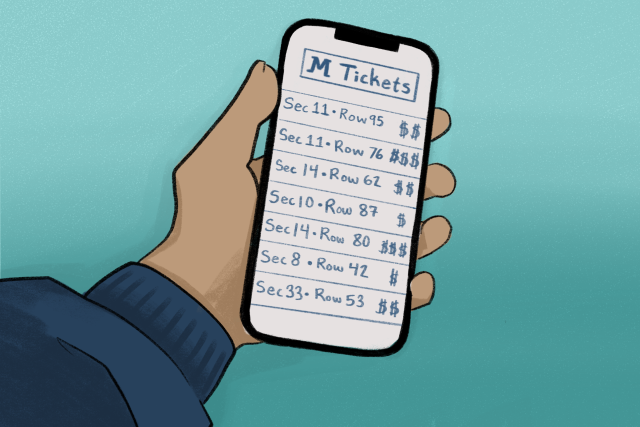[ad_1]
Last University of Michigan football season, I missed the deadline to buy student tickets. Not wanting to miss what turned out to be a championship season, I set out to buy tickets elsewhere. I heard stories about friends getting scammed, so I first tried StudentSeats, an app for U.S. college students to exchange student tickets. But with a limited number of tickets for sale and extra fees added on, buying tickets from this app was too expensive.
Next, I tried a student ticket GroupMe chat that my roommate recommended. GroupMe is a messaging app for large groups, similar to a texting thread. The U-M ticket chat seemed decently secure at first. My roommate added me to the message thread and I filled out a form with my uniqname. The app’s best practice to prevent scams is to send a picture of your Mcard when selling to prove you are a real student. But, if you accidentally send that to a scammer, they can impersonate you in another chat.
This left me with limited options: I could pay an extra $20 to $50 in fees for a ticket on an exchange like StudentSeats, hope that I didn’t get scammed on GroupMe or annoy everyone I knew by asking if they were selling a ticket to the upcoming game.
My situation isn’t unique. Although I remembered to purchase my season tickets this year, many students did not. This includes freshmen who — for their first season — could only buy a pack of four tickets rather than the whole season pass. With increasing enrollment and a stagnant number of seats, this problem will only get worse. Demand for tickets will continue to increase, along with scams and ticket fees on apps.
Students, especially freshmen, are disadvantaged by the absence of a centralized market for tickets. Michigan Athletics should step in and create a platform for Michigan students to buy and sell athletic tickets. This app would regulate the market to bolster game day security and prevent students from falling victim to scams. Given that Michigan Athletics already has security systems and ticket transferring platforms in place, it should be relatively easy for the University to step in and protect its students.
I will admit that this plan will be complicated to put into action; the University of Michigan will have to both develop and implement a platform that will require money and a significant amount of time. But, in the long-term, this platform makes the most sense for the University of Michigan and its students.
Ideally, Michigan Athletics would embed a buying/selling option into the Michigan Athletics website that leads to a platform exclusively for U-M students. Right now, students can transfer tickets only if they have the recipient’s email or phone number. This new platform would essentially function like StubHub or Ticketmaster and build upon the current transfer system. Students would list their tickets with an asking price and negotiate with the potential buyer. Once bought, the tickets would be transferred and Michigan Athletics would send the payment to the seller’s bank account. These tickets would still require Mcard verification at the gate to ensure only students are using the tickets. Given that a Michigan Athletics account setup requires layers of security like DuoMobile and email verification, students would be completely sure that tickets are real.
Since it will cost money to develop and maintain this app, Michigan Athletics should thus charge a fee for ticket transactions that covers their costs and nothing more. The platform will simply function as an extra security measure for ticket transfer and a way for the University to bolster its public image — a pursuit that could benefit a controversial administration. Additionally, cost should be kept low because Michigan has an obligation to its students. Having a great experience at football games is one of the things that draws students to pay tens of thousands in tuition. We deserve a seamless and cost-effective method of navigating ticket sales.
However, creating this platform would inevitably supersede the student venture MaizeTix, a buying and selling ticket website for Michigan students. It’s not a great look for the University of Michigan to make a student business obsolete, especially since the business uses funds from the University’s Center for Entrepreneurship. But this student-run company isn’t working well for students. As of right now, the going rate for a Michigan vs. Michigan State student football ticket on GroupMe is $90. On MaizeTix, it’s $144.75. Why should the University of Michigan preserve a student venture if that venture isn’t benefiting students?
The creation of a centralized student ticket exchange will help U-M students and reinforce online security. It’s a security liability to have anyone impersonate a U-M student, even if it’s for something low-stakes, like attending a football game. If the status quo is maintained, ticket scams will only increase with enrollment. The University of Michigan has left students vulnerable to an unregulated market and it’s time they step in and do something — both for the well-being of students and the security of U-M systems as a whole.
Eliza Phares is an Opinion Columnist who writes about U-M administrative policy and campus life. She can be reached at ephares@umich.edu. Her column “Campus Conversations” runs bi-weekly on Thursdays.
Related articles
[ad_2]
Source link











